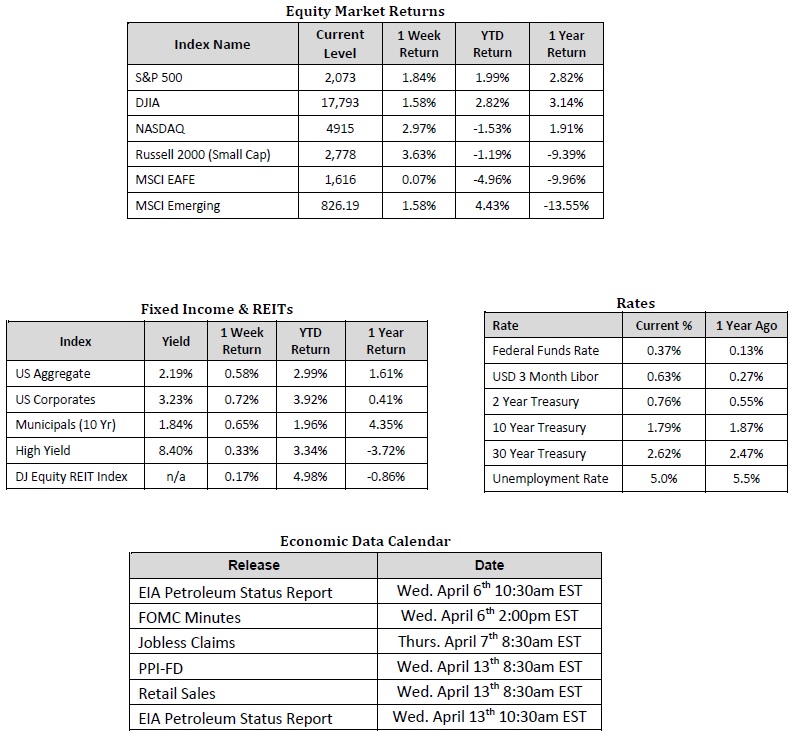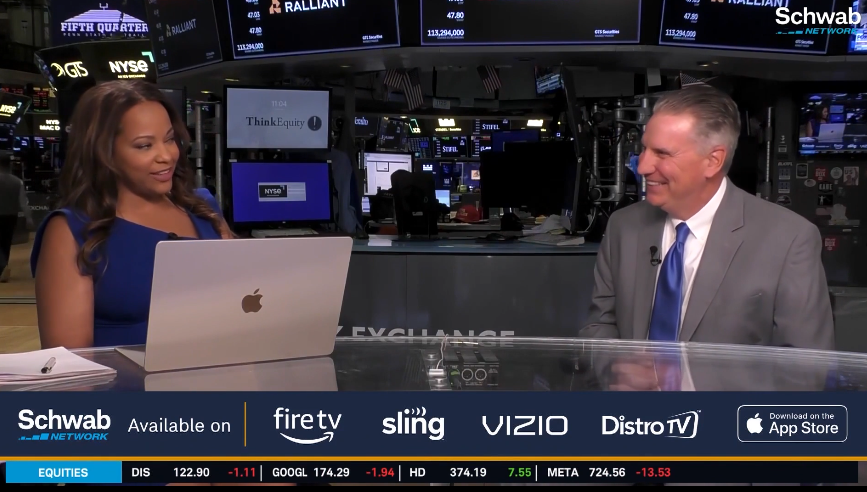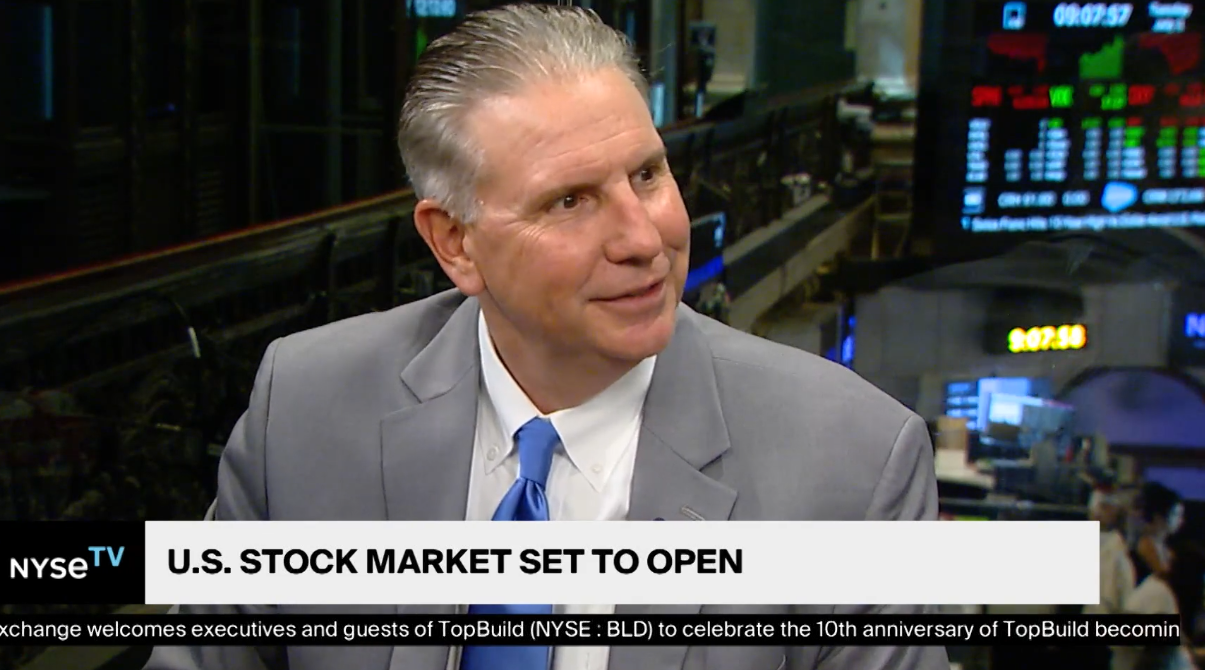
Markets Finish a Volatile Q1 Slightly Higher
Market Overview

Sources: Equity Market, Fixed Income and REIT returns from JP Morgan as of 04/01/16. Rates and Economic Calendar Data from Bloomberg as of 04/04/16.
Happening Now
The first quarter of 2016 came to a close last Thursday leaving in its wake three months of volatility in U.S. stocks* that concluded with a 6.8% gain in March. For the year, the S&P 500 Index finished Q1 up 1.8%, a far cry from the 10% tumble the benchmark took from the start of the year to February 11 when stocks bottomed. In terms of sector performance, Utilities (+15.6%) and Telecom (+16.6%) performed best while Healthcare (-5.5%) and Financials (-5.1%) struggled. Internationally, developed markets* were down 3% and continue to lag Emerging markets* which finished Q1 up 5.4%.
A major story throughout 2015 was the strength of the U.S. Dollar and the varying effects a strong domestic currency has on investors, businesses and debt issuers. This trend reversed course in the first quarter to the benefit of U.S. investors who held allocations to European and Japanese equities. Remember that the returns you reap when investing internationally are a function of not only the performance of the stock but also of that stock’s local currency. Consider the table below:

Despite the negative returns witnessed during the first quarter in many markets around the globe, U.S. investors purchasing stocks with US Dollars were far better off than foreign buyers of the same stocks who invested using their local currency.To be clear, we believe that these trends are likely to reverse throughout the rest of 2016 with certain international markets outpacing U.S. stock returns. We also forecast the U.S. dollar to strengthen versus the Euro as the Federal Reserve tightens monetary policy and while other major, international Central Banks keep rates low and in some cases, negative.
Given the many options investors have with regards to products that narrowly focus on specific sectors, hedge currency exposures, utilize an alternative strategy, or provide leverage, individuals must take an active role in understanding what they own and why they own it. The dynamics of the global economy we face today can cause currencies, interest rates, and stock prices to change unexpectedly and affect one another. Determining how your investments are likely to respond to these changes is critical and can often be the difference between remaining steadfast in your approach or making the detrimental mistake of moving to cash at the wrong time.
*U.S. Stock returns are represented by the S&P 500 Index. International Developed Markets are represented by the MSCI EAFE Index. Emerging Markets are represented by the MSCI EM Index.
Important Information and Disclaimers
Disclosures: Hennion & Walsh is the sponsor of SmartTrust® Unit Investment Trusts (UITs). For more information on SmartTrust® UITs, please visit www.smarttrustuit.com. The overview above is for informational purposes and is not an offer to sell or a solicitation of an offer to buy any SmartTrust® UITs. Investors should consider the Trust’s investment objective, risks, charges and expenses carefully before investing. The prospectus contains this and other information relevant to an investment in the Trust and investors should read the prospectus carefully before they invest.
Investing in foreign securities presents certain risks not associated with domestic investments, such as currency fluctuation, political and economic instability, and different accounting standards. This may result in greater share price volatility. These risks are heightened in emerging markets.
There are special risks associated with an investment in real estate, including credit risk, interest rate fluctuations and the impact of varied economic conditions. Distributions from REIT investments are taxed at the owner’s tax bracket.
The prices of small company and mid cap stocks are generally more volatile than large company stocks. They often involve higher risks because smaller companies may lack the management expertise, financial resources, product diversification and competitive strengths to endure adverse economic conditions.
Investing in commodities is not suitable for all investors. Exposure to the commodities markets may subject an investment to greater share price volatility than an investment in traditional equity or debt securities. Investments in commodities may be affected by changes in overall market movements, commodity index volatility, changes in interest rates or factors affecting a particular industry or commodity.
Products that invest in commodities may employ more complex strategies which may expose investors to additional risks.
Investing in fixed income securities involves certain risks such as market risk if sold prior to maturity and credit risk especially if investing in high yield bonds, which have lower ratings and are subject to greater volatility. All fixed income investments may be worth less than original cost upon redemption or maturity. Bond Prices fluctuate inversely to changes in interest rates. Therefore, a general rise in interest rates can result in the decline of the value of your investment.
Definitions
MSCI- EAFE: The Morgan Stanley Capital International Europe, Australasia and Far East Index, a free float-adjusted market capitalization index that is designed to measure developed-market equity performance, excluding the United States and Canada.
MSCI-Emerging Markets: The Morgan Stanley Capital International Emerging Market Index, is a free float-adjusted market capitalization index that is designed to measure the performance of global emerging markets of about 25 emerging economies.
Russell 3000: The Russell 3000 measures the performance of the 3000 largest US companies based on total market capitalization and represents about 98% of the investible US Equity market.
ML BOFA US Corp Mstr [Merill Lynch US Corporate Master]: The Merrill Lynch Corporate Master Market Index is a statistical composite tracking the performance of the entire US corporate bond market over time.
ML Muni Master [Merill Lynch US Corporate Master]: The Merrill Lynch Municipal Bond Master Index is a broad measure of the municipal fixed income market.
Investors cannot directly purchase any index.
LIBOR, London Interbank Offered Rate, is the rate of interest at which banks offer to lend money to one another in the wholesale money markets in London.
The Dow Jones Industrial Average is an unweighted index of 30 “blue-chip” industrial U.S. stocks.
The S&P Midcap 400 Index is a capitalization-weighted index measuring the performance of the mid-range sector of the U.S. stock market, and represents approximately 7% of the total market value of U.S. equities. Companies in the Index fall between S&P 500 Index and the S&P SmallCap 600 Index in size: between $1-4 billion.
DJ Equity REIT Index represents all publicly traded real estate investment trusts in the Dow Jones U.S. stock universe classified as Equity REITs according to the S&P Dow Jones Indices REIT Industry Classification Hierarchy. These companies are REITSs that primarily own and operate income-producing real estate.



